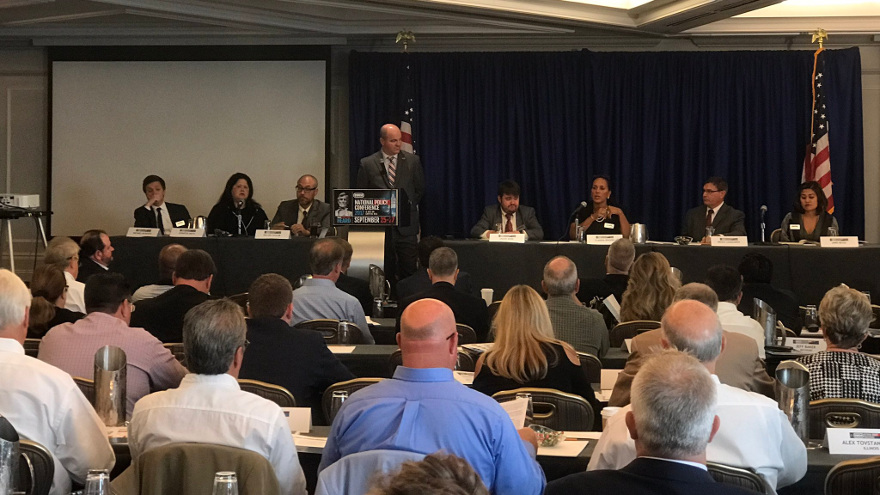From the editor: The CFPB and a fire alarm

Dealers who attended NIADA's National Policy Conference urged the contingent from the Small Business Administration to intervene with regard to the rule involving arbitration finalized by the Consumer Financial Protection Bureau. (Photo courtesy of NIADA)
By subscribing, you agree to receive communications from Auto Remarketing and our partners in accordance with our Privacy Policy. We may share your information with select partners and sponsors who may contact you about their products and services. You may unsubscribe at any time.
WASHINGTON, D.C. –
There didn’t appear to be any obvious connection between a representative from the Consumer Financial Protection Bureau finishing his presentation during the National Policy Conference hosted by the National Independent Automobile Dealers Association and the hotel fire alarm activating as a question-and-answer session started.
While not trying to perpetuate some wild conspiracy theory, perhaps the underlying simmering of dealers in the room triggered the fire alarm on Tuesday morning.
The CFPB’s Damion English took the stage in front of what could have been considered a hostile audience — nearly 200 independent dealers and other automotive industry service providers who might have had varying assessments of how the bureau is impacting and possibly curtailing their businesses. English serves as the bureau’s auto finance program director and came to the agency after prior positions with Regional Acceptance, Capital One Auto Finance, American Honda Finance and as finance manager for the Victory Automotive Group.
English insisted the bureau is trying to gather all the information it can about how vehicle financing and deliveries happen, stressing that the CFPB wants input from dealers “because you know your business better than we do.”
Apparently making a favorable impression, an abbreviated Q&A segment started with one dealer telling the gathering that English was “the coolest person I’ve seen from the CFPB.” English welcomed the kind words by replying, “Thank you. I appreciate that. I’m going to tell my mom!”
Then moments later, the fire alarm began and the staff at the Dupont Circle Hotel asked us all to depart the facility. Outside, as the Washington, D.C. Fire Department arrived to confirm it was a false alarm, several dealers approached English and his two other CFPB colleagues for informal conversations. They all appeared civil but certainly intense.
Subscribe to Auto Remarketing to stay informed and stay ahead.
By subscribing, you agree to receive communications from Auto Remarketing and our partners in accordance with our Privacy Policy. We may share your information with select partners and sponsors who may contact you about their products and services. You may unsubscribe at any time.
Dealers are concerned about the CFPB’s new rule regarding arbitration. NIADA came out with multiple efforts to keep it from going into effect as it is on track to do so early next year.
NIADA pointed out that the CFPB’s study on arbitration found consumers receive on average more than $5,000 in arbitration hearings compared to roughly $32 in class-action litigation — if they receive anything at all.
“We are disappointed that the bureau has decided to adopt this ill-conceived rule,” NIADA chief executive officer Steve Jordan said when the bureau finalized the rule back in July. “(This) action shows the CFPB has decided to put the interests of class-action lawyers above those of the very consumers the bureau is mandated to protect.
“Arbitration has proven to be a faster, less expensive and more effective means of resolving consumer disputes than class-action lawsuits. And consumers who receive an award in arbitration almost always receive more than they would in a class-action lawsuit, a point proven by the CFPB’s own research,” Jordan continued.
“This rule will force small businesses to bear additional costs in defending class-action litigation, particularly meritless suits,” Jordan went on to say. “Those costs will ultimately be borne by consumers, and in the case of those who are credit-challenged, it could prove to be too much.”
The thought that dealers could face class-action lawsuits instead of settling matters via arbitration is leaving NIADA members uneasy to say the least. Later on Tuesday when the Small Business Administration made its conference presentation, multiple attendees fervently implored that the government entity designed to aid businesses such as independent dealers to intervene.
“Somebody in this town has got to help us,” one attendee said at the venue located less than a test-drive distance away from the White House and Capitol Hill.
The House approved resolution on July 25 leveraging authority provided under the Congressional Review Act (CRA) to stop the CFPB’s final rule prohibiting the use of class action waivers in arbitration clauses. Despite all House Democrats and one Republican voting against H.J. Res 111, the resolution cleared the chamber by a vote of 231-190.
Ever since, it’s been the Senate’s turn, but various online reports have indicated the margin for a similar resolution getting the necessary 51 votes for approval is slim — if it exists at all.
By now, dealers who went to our nation’s capital this week likely have returned to their stores to secure inventory, finalize deliveries and complete a long list of other chores necessary to remain a profitable enterprise. I applaud those dealers who participated in NIADA’s activities. Any fruits from the efforts might take some time to ripen, but at least they were planted.
Nick Zulovich is senior editor of SubPrime Auto Finance News and can be reached at [email protected].


